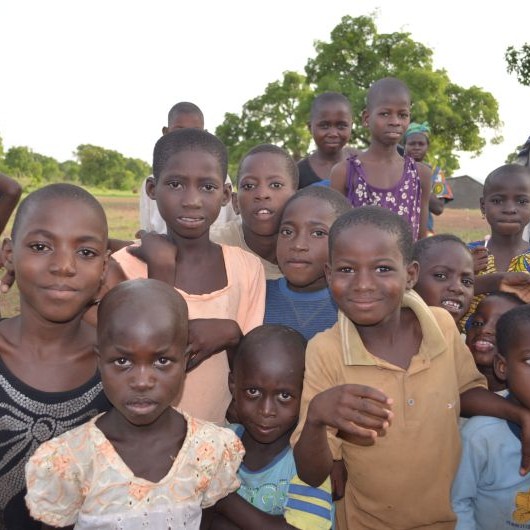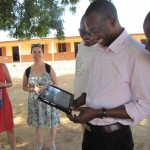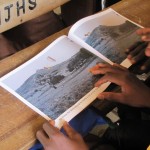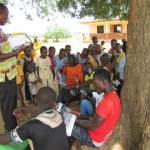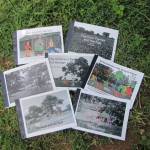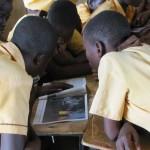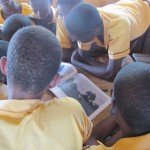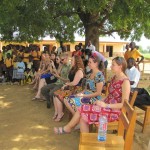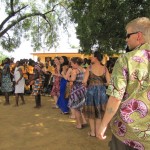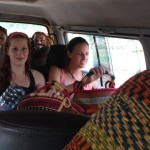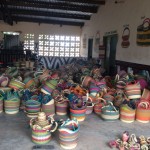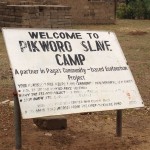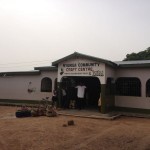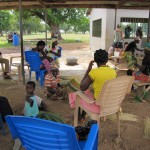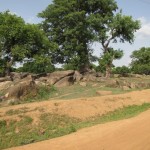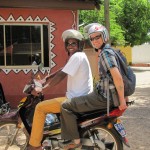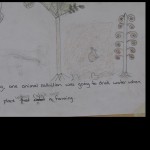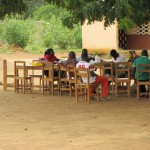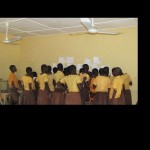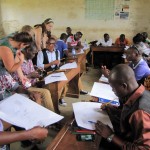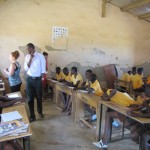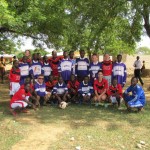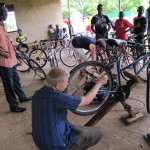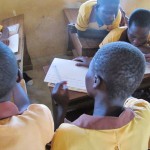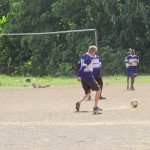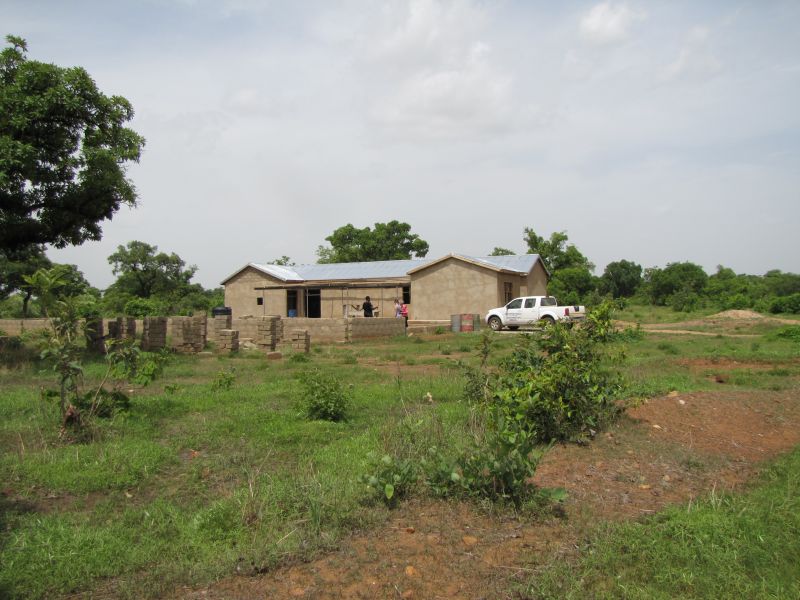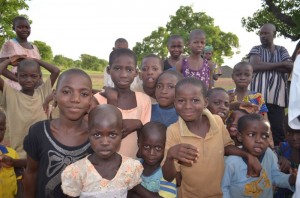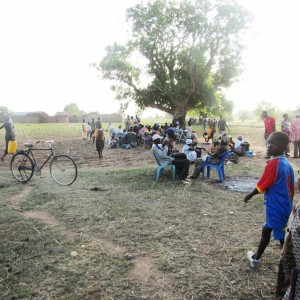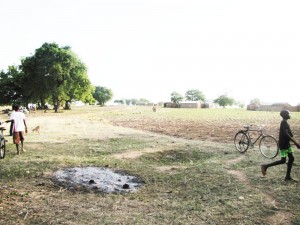Cindy Bourne, and her team of teacher candidates, are thrilled to present the seven books online:
7 stories
Standard
Reading stories to children is one of our society’s greatest pleasures and we know reading to children can have a lasting impact and can open doors to imagination, learning, and a love of literature.
The Nabit people, located in the Upper East Region of Ghana, have many wonderful folk stories that have been handed down from generation to generation. Teacher-candidates from the UBC Okanagan Faculty of Education worked with two local Junior high schools to take 7 of those stories and create English versions (English is the official language in Ghana). The high school students provided superb, colourful images to go with the stories and did all of the translation, the end result is 7 culturally relevant stories that almost everyone in the community can recognize.
The Nabit people are a proud people with a rich culture. Much of the economy is subsistence farming, the region is one of the poorest in Ghana and there are many challenges in providing education and resources. In the Nabdam school district, there are limited books which available for children when they are learning to read. What books are accessible are often donated from overseas, and while helpful, are often not culturally relevant.
At the celebration held to hand over the books on our final day, one community member picked up a book and started sharing it with the pre-schoolers who were watching the fun. He was delighted with the books, and the opportunity to read a familiar story to the kids and commented that” these are very important to our people, we NEED them!”. Indeed every adult who saw the books recognized the stories immediately, appreciated the care and detail the student artwork provided and wanted to know how they might be able to obtain copies or if they would be in the library. These books will increase opportunities for literacy and provide enjoyment for all ages. As we leave, the momentum to gather material for future books is already underway.
These stories have an additional benefit. Dovetailing with the Education project was Robyn Giffen’s Master’s research which is to create a writing system for the Nabit people so that they can begin to write in their own language as well as in English. Robyn was in Ghana at the same time as the education students and through the results of her research and the work of the local Nabit Language Committee, the books will also introduce some of the first Nabit words into print. A longer term plan is to put bi-lingual copies of these books in every primary school and local libraries and for private purchase.
Interest in the books is widespread across the Nabdam school district and we know it has opened up possibilities for all ages. Fundraising activities are underway both in Canada and in Ghana to ensure that copies of the books become available in the primary.
Perhaps the happiest moments of the trip…
Gallery- Headmaster sees the books for the first time.
- Youth explore the pages that they helped illustrate. Notice the the colourful drawings…
- The group reading the books for the first time
A magical ending…
Gallery- The seven Nabit folk stories, printed and professionally bound. There is a huge appetite to get these into the schools, particularly the primary grades. The final drafts that go for professional printing will have Nabit words as the result of Robyn Giffen’s work with the Nabit Language committee. The printer quoted a price of one cedi each for a print run of 500 books. the Cedi is worth less than 40 cents Canadian so a pretty good price.
- Kids exploring the books they created. They were very engaged and very proud of their work.
- Justifiably proud of their work, these kids were excited to find their drawings and narration in a storybook.
- These are the drummers who were at the school to entertain us. They started reading the books and very pleased to see stories from their childhood in book form. They were also delighted with the photos which were the surrounding countryside of the Nabit people, and with the drawings of the junior high school students. One drummer called over some of the primary kids who were on their lunch break and read one of the books to them. It was a magical moment for all of us involved in the project.
- The school and our hosts arranged a wonderful afternoon of drumming and dancing for the UBC students…
- and as you can see, we were all drawn into the fun. It was a magical ending to a good project.
The story behind the project
StandardThe story behind the project:
This project arose in part, out of the doctoral research of Cindy Bourne.
Bourne is interested in developing design principles that institutions might consider when positioning professional faculties in global service learning projects that are located in challenging contexts such as the Upper East Region of Ghana. In this case, communities and teaching staff in the Nabdam school district were interested in developing culturally relevant material to support learning in schools.
Working closely with in-country partners, Bourne and her doctoral supervisor Dr. Susan Crichton developed a book project that provides teacher candidates in the Faculty of Education, Okanagan Campus, with an opportunity to position their knowledge in a meaningful way, increases English competency for high school students, and provides culturally relevant material for primary students.
- … the GRIP students found the baskets irresistable – now how to get them in a suitcase.
- Blessing basket company – and NGO that provides a market for baskets from this region, regarded as some of the most beautiful baskets in the world.
- The slave camp. There are a few of these in the northern areas of Ghana, and they are a sobering reminder of one of the saddest parts of Ghanaian history.
- A visit to the crocodile pond where legend has it that there is an understanding between the crocodiles and human beings. Indeed the understanding seems to be working..
With the books at the printers, the student-centered learning pro-d day and the bike workshop behind us, it was time for a bit of fun. The team took some time out to visit a few of the local attractions. The team of teacher candidates visited a nearby crocodile pond, where legend has it that there is an understanding to inflict no harm between the crocodiles and humans. All of the GRIP students took the risk and either sat, or gave a pat, to the crocodiles.
Afterwards, the group visited the Slave camp. A sober reminder of one of the most shameful chapters in world history, and chapter that lasted more than 200 years. On the way back to Bolgatanga the team stopped at a basket-making centre north of Bolgatanga. This region of Ghana is renowned for making some of the world’s most colourful, and beautiful, baskets. The baskets are made by local weavers who work out of their homes, as well as in the craft centre.
The hard part is choosing, and then somehow fitting them in a suitcase…. we found however that the baskets will squish into the suitcase very well, and have been told they will regain their shape after being immersed in water.
As the crowded van suggests, there was little resistance!
The world around us…
Gallery- Blessing basket company. We watched the weavers working on baskets and will go back there to purchase some. Upper East Ghana is known for making some of the most beautiful baskets in the world.
- The landscape is unique, beautiful trees, red red soil, amazing rock formations. Subtle differences within a few kilometers too.
- Riding on the back of a small motorbike or scooter is a quintessential Ghana experience. So far Stephen, Cindy and Robyn have enjoyed the thrill…!
- story boarding “All the Animals in the Nangodi Forest”
- In Ghana, the staff room is almost always under a shady tree. This is where teachers do their marking, meet and generally pass the time when not teaching.
- These Sakote Jr. Secondary students are in the process of storyboarding and editing…it was noisy! At the end of the session they taught any of us who were interested the trick of carrying a bucket of water on our head. Stephen was the overall winner…
See what we see…
Gallery- Professional development workshop in the classroom
- In the classroom
- In keeping with world cup fever, some of the GRIP students agreed to play a game during the morning break (our in-country support guy, Josbert Zure)
- Bike workshop in Nyobok – home village of Project GROW
- Nangodi junior secondary students working on the folk tales
- Soccer fever…
Update from team Ghana
StandardIt has been an action packed 10 days in Bolgatanga (affectionately known as Bolga by the locals), 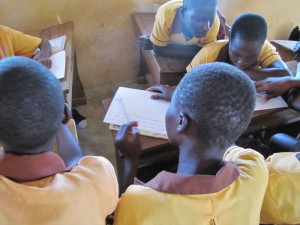 and this update is long overdue. The student team arrived in Accra on June 5th to one of the city’s heaviest rainfalls in years. Since it’s rainy season, we expected rain, but this a deluge that lasted over 7 hours and made the front page of the Ghana news. With more rain to come we were happy to fly north to Tamale, and from there a 2-hour shuttle to Bolga. Arrived at the Comme ci Comme ca to a very warm welcome.
and this update is long overdue. The student team arrived in Accra on June 5th to one of the city’s heaviest rainfalls in years. Since it’s rainy season, we expected rain, but this a deluge that lasted over 7 hours and made the front page of the Ghana news. With more rain to come we were happy to fly north to Tamale, and from there a 2-hour shuttle to Bolga. Arrived at the Comme ci Comme ca to a very warm welcome.
A bit about the project.
We are working with the Nabdam School District, a new district that represents the Nabit language group. The goal of the project is to develop culturally relevant resources for the local schools so we are taking traditional Nabit folk tales and turning them into books. The team is working with junior high school students who, in their English classes, have discussed, collaborated, and agreed on a total of 7 favorite folk stories, which have never been 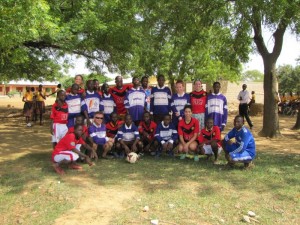 committed to print before.
committed to print before.
Robyn Giffen’ s master’s research is to construct a writing system for the Nabit people. Nabit is presently an oral language, and Robyn’s work begins the journey to develop a written language. This work is in keeping with the Ghanaian Government’s initiative to include mother tongue languages instruction in school curriculum.
As Robyn’s work progresses alongside the GRIP students’ project, the community is hoping to include a few Nabit words in the first editions of these folk tale books. The team plans to leave the 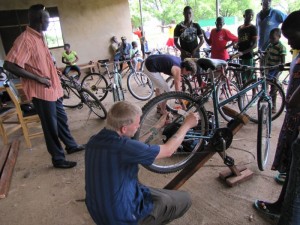 digital form of the original books as well as printed copies when we leave; as the written language develops, the next printing of the books, we hope, will be bilingual. The school kids are enthusiastic about the projects, and with their teachers’ support they are providing much of the illustration for the books.
digital form of the original books as well as printed copies when we leave; as the written language develops, the next printing of the books, we hope, will be bilingual. The school kids are enthusiastic about the projects, and with their teachers’ support they are providing much of the illustration for the books.
The team was also invited to provide a Professional Development workshop around encouraging a more student-centered pedagogy in the classroom. The GRIP students, Cindy Bourne, and Project GROW representative Josbert Zure, provided this workshop. While it was a challenging day on many fronts, the feedback was excellent. There is a desire for more UBC sponsored workshops… Perhaps next time we can do a full on Maker Day!
Last, but not least, we held a bike repair workshop which ostensibly was to provide an opportunity for the 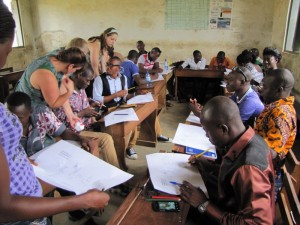 adults who own bikes in Project GROW’s home community, Nyobok, to learn how to maintain their bikes. Best laid plans seldom work out the way we expect and we arrived on site to find more than 100 bikes in need of repair – each bike a different model, ranging from substantial need of repair to unfixable. The goal of a well-ordered workshop went quickly out the window and all of us spent the better part of a hot day bent over repairing brakes, warped wheels, flat tires and a host of other issues, We had to turn many away, but managed to get more than 50 back on the road. Our team was grateful to the 5 local Nyobok students, with whom we are working on our book
adults who own bikes in Project GROW’s home community, Nyobok, to learn how to maintain their bikes. Best laid plans seldom work out the way we expect and we arrived on site to find more than 100 bikes in need of repair – each bike a different model, ranging from substantial need of repair to unfixable. The goal of a well-ordered workshop went quickly out the window and all of us spent the better part of a hot day bent over repairing brakes, warped wheels, flat tires and a host of other issues, We had to turn many away, but managed to get more than 50 back on the road. Our team was grateful to the 5 local Nyobok students, with whom we are working on our book 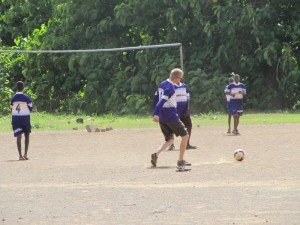 project, pitched in and helped. It was great – simply providing the tools to the students was all we need to fix all kinds of problems.
project, pitched in and helped. It was great – simply providing the tools to the students was all we need to fix all kinds of problems.
We plan to leave the tools with those high school students, and with the blessing and support of school headmaster, Francis Saapat, Stephen will spend one afternoon teaching them some of the things they need to know in order to carry on. The opportunity for these young people to start a village bike repair business on Saturdays was too good to pass up.
This week we focus solely on the folk tales (although Stephen has also decided to lend his carpentry skills. and with the help of some students, will fix broken desks in the schools).
It is very hot, there are many challenges, but we are all having a great experience. The pictures tell it 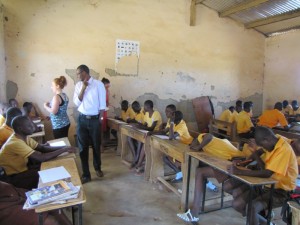 all.
all.
Greetings from Bolgatanga!
Standard Guided Reflective Inquiry Project (GRIP) in Ghana
June 3, 2014 (Bolgatanga, Ghana)
It is 3 days before the Faculty of Education’s student team, Jessica Bens, Holly Corbett, Meghan Epp, Alisha Hoy, Dorothy Marcy, Stephen MacInnis and Sara Pereira arrive to begin their project with the Nabdam Schools just outside Bolgatanga, Upper East, Ghana. Invited to participate in a collaborative project with the Nabdam School District, the Nabit Language committee and Project Ghana Rural Opportunities for Women (GROW), the students will work with local Ghana hosts to co-create books that reflect the Nabit culture and provide culturally relevant material for primary schools.
The GRIP project
The Nabit people grow up with traditional stories, and they have chosen 4 to become the material for the storybooks. The Faculty of Education’s teaching candidates will collaborate with local teachers and local high school students to gather photos and text. Local high school students will write the text and their participation will serve as part of their English coursework.
Over the next few weeks there will be many forays into the countryside as the teacher candidates work with the high school students to collect the photographs that will illustrate the books.
Making comes to Ghana
Along with the book project, the Nabdam school district has asked if the UBC students would be able to conduct an inquiry-based workshop, thus creating an opportunity for a inquiry-orientated learning Ghana. On June 13th, the student team will welcome 32 teachers from the local schools.
Finally, our team is especially lucky to have one of our Secondary Teacher Education Program (STEP) students, with a background in the trades, who will offer a bike workshop which will also modeled on the maker day approach. Our whole team will participate.
Many of the adults have bikes and are looking forward to a chance to participate and the event will be held in the new community centre located in the host village of Project GROW (Nybok).
Nabit Language
Alongside the UBC GRIP project, Robyn Giffen, a UBC linguistic anthropology student, will research the creation of an alphabet and writing system. As part of her master’s degree research, she will be interviewing members of the community since we arrived with the goal of helping the community establish, for the first time, an alphabet and writing system. Robyn is working with the Nabit language committee. Her project’s long term goal is for the Nabdam school district to have material in the Nabit language available in the primary grades, keeping with the Ghanaian Government mandate to include more mother tongue resources in their education program, Robyn’s work is a significant step in that direction.
Why Ghana?
The communities involved in this project have an established relationship through Project GROW, an NGO that began on the UBC Okanagan campus, and through Dr. Vida Yakong. Yakong, co-founder of GROW, completed her graduate studies at UBC’s Okanagan campus. Over the past 7 years GROW has developed a number of sustainable, economic activities that have improved the lives of women and their families in several Nabdam communities.
Over the course of Project GROW’s activities there has been sustainable positive change. For example: malaria has been significantly reduced, there is a school lunch program, a micro-loan program, a girl-child education program, a livestock program, and an adult education program; however, the schools still lack resources,
One notably resource is culturally relevant reading material. This year’s project is a chance to contribute in a different way by building capacity in the schools, while providing a unique experience for our UBC teacher candidates
Throughout the next few weeks the teacher candidates, myself, and perhaps some of our in-country partners will be sharing our experiences – hope you enjoy the journey with us!
